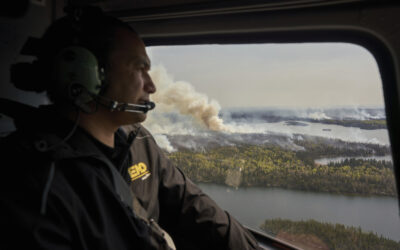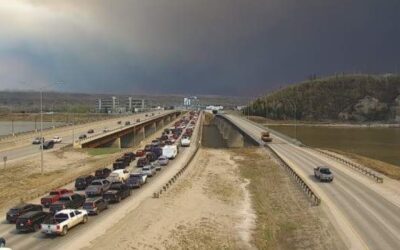Awhile back, I was honored to speak at two different U.S. Forest Service fire leadership sessions. I’m always excited to speak to these groups. I’ve been retired for a few years and don’t get to hang out around the station with firefighters anymore. So, if I get to visit and talk with firefighters about leadership… well that’s about the best day I can have.
When anyone addresses a group about any subject, an indication of how well you as the speaker are connecting with the group is the question-and-answer portion of your presentation. You can judge a lot about the group by the questions they ask. In the case of my two FS engagements, the questions came fast and furious. Yes! They were interested in the topic; they were engaged, and they wanted to hear more. From my perspective, it couldn’t have gone any better. I never present a topic like I’m the absolute expert. I just relate stories from my 44-year career and offer a perspective for them to think about. That’s a lot easier than having to prove I’m the expert and know it all, because no one knows it all.
A week or so after my two leadership talks, I participated in a wildland fire staff ride for a wildland fire agency’s middle-leaders group. I’ve been a part of the same staff ride for the last few years because I had an integral role during the fatalities that occurred. I’m used to standing there in front of 30 or more firefighters telling my story about what happened at that same spot so many years ago. It’s kind of like talking about a shameful experience. Almost like talking about a rape in the family. There’s shame and regret… wondering about what you could have done differently. Why didn’t I do more? Who else feels the shame of inaction that might have contributed to the fatalities. I guess it’s all part of the survivor’s guilt that many of us deal with.
I didn’t talk about this incident very much until a few years ago when I was approached to be a part of the staff ride. Since then, I’ve gotten used to talking about my actions that fateful day. It’s probably healthy to speak about the biggest fireground tragedy that I was involved with in my long career. Healthy and cathartic, painful, depressing… it’s all those things. But more importantly I’ve experienced some real growth on my part from the questions that the young fire leaders ask me when I’m standing there baring my soul to them. Their questions have been amazingly interesting to hear. And you can listen to a podcast on this subject at BobbieOnFire.com. Episode number 87, “How Are Your Leadership Skills In A Crises?” http://bobbieonfire.com/2022/12/01/87-how-are-your-leadership-skills-in-a-crises/
As has happened almost every time I’ve spoken at the staff ride, I walk away wondering about the firefighters and the questions they asked me. Sometimes I’m surprised by their questions. Most often they want to know what I was thinking about during the fire’s blow up, or where my fireline supervisor was or what were the dynamics between the hotshot crews and me at the time that everything was going to hell around us. But at this last staff ride a month ago, there were no questions. None. But that was just fine with me. Often times, the questions make me uncomfortable… having to question my actions or inactions or give some deep thought into my personal preparedness that day. But this was a different staff ride and a different group dynamic. No questions.
I didn’t think much about it until I was on the two-hour drive home the next day. As I was driving down the mountains back to the city, I started thinking about the differences between those leadership talks a week before where the firefighters were engaged, discussing, asking questions, and even challenging me. What a rich learning environment that was. But what a dichotomy between the two environments. I kept thinking about it. It’s like an itch that I keep wanting to scratch but no relief comes. Why the differences? It was really itching.
Although the topics were different, foundationally, they were all about leadership. And since the groups were mostly at the engine and crew captain level, there was some similarity in the participants. So why the huge disparity of participation between the groups? I kept scratching the itch.
My perception is that the organizational culture of the staff ride group was just very different than those earlier groups where I spoke about leadership.
Leaders set the tone for a learning environment. Is it ok to ask questions? Do we encourage curiosity? How comfortable are your crews speaking up around the boss? What’s the supervisor’s reaction to being respectfully challenged by a subordinate? Do we encourage discussions, or do we prefer if our folks just listen and stay quiet?
I know when I was still working, I must have instilled a good learning environment because the firefighters in my organization were constantly challenging me. Not in a disrespectful way, but they knew it was safe to ask questions, to disagree and to propose their own answers to a particular issue facing the organization. Wow, that was a great environment for me to lead in. It could be stressful for me as the leader, but I got to hear what my folks were thinking. And most often, their ideas were intelligent and well thought out. And the resulting discussions helped educate both them and me.
Think about it, if you never asked questions at school, you might as well have just stayed home and read a book. Questions are the lifeblood of learning. Without questions and discussion, learning is stifled.
So, let’s go back to the groups I spoke with recently. What could be the answer why one group was so reticent to speak up and ask questions while the others were talkative and engaged in the conversation? Maybe the quiet group didn’t know each other and didn’t have the comfort or confidence to speak up. That’s a totally reasonable assumption. But regardless of the reason, learning is still stifled when there’s no discussion. If you’re the leader of a group and you can see your personnel are hesitant to speak up… do something! You ask the questions. Get the ball rolling. And if you’re not a formal leader and no one is speaking up, then Be A Leader and engage. Be the first one on the dance floor that everyone has been waiting to follow.
There are other reasons why people don’t speak up to ask questions. They might feel insecure within the group and are afraid to draw attention to themselves. They might be intimidated by the speaker or their overhead. But for whatever the reason, you as the formal leader want there to be learning. And learning requires questions and discussions.
Why do we even want a learning environment? Is it your job to encourage a learning environment? You might think that’s not your job. I suppose if you plan on pulling all the hose packs off your engine yourself, setting up every pump and cutting every inch of line the crew is putting in, you don’t need to foster a learning environment. But if you expect top performance from a well-oiled crew, you’d better hope they’re intellectually curious. Curiosity helps them understand their job, their co-worker’s jobs and especially your job.
Remember the term “leaders’ intent?” A curious employee will make you look better because they’ll know what you want and anticipate your direction. It makes them smarter firefighters and we need smart firefighters.
Back to asking questions; You as the leader should be asking your supervisors questions. That’s how you get clarification on the task ahead. If your folks know you ask questions, they’re more likely to ask you questions too. But don’t feel threatened by the questions. Being the boss doesn’t mean you’re smarter or better at everything your crew is doing. It means you have a different job than them. You’d better be competent and know your job, but your role as a leader is different than the cutters on the crew.
If you want to work with the best handcrew, engine, helicopter module or IMT, do your part to encourage curiosity with your personnel and co-workers. And that means asking lots of questions and engaging in discussions. Be the leader we all need and ask the first question.
Now Available
Both Sides of the Fire Line is Bobbie Scopa’s uplifting memoir of bravely facing the heat of fierce challenges, professionally and personally. It’s available now.
Order from Amazon Order from Barnes & Noble
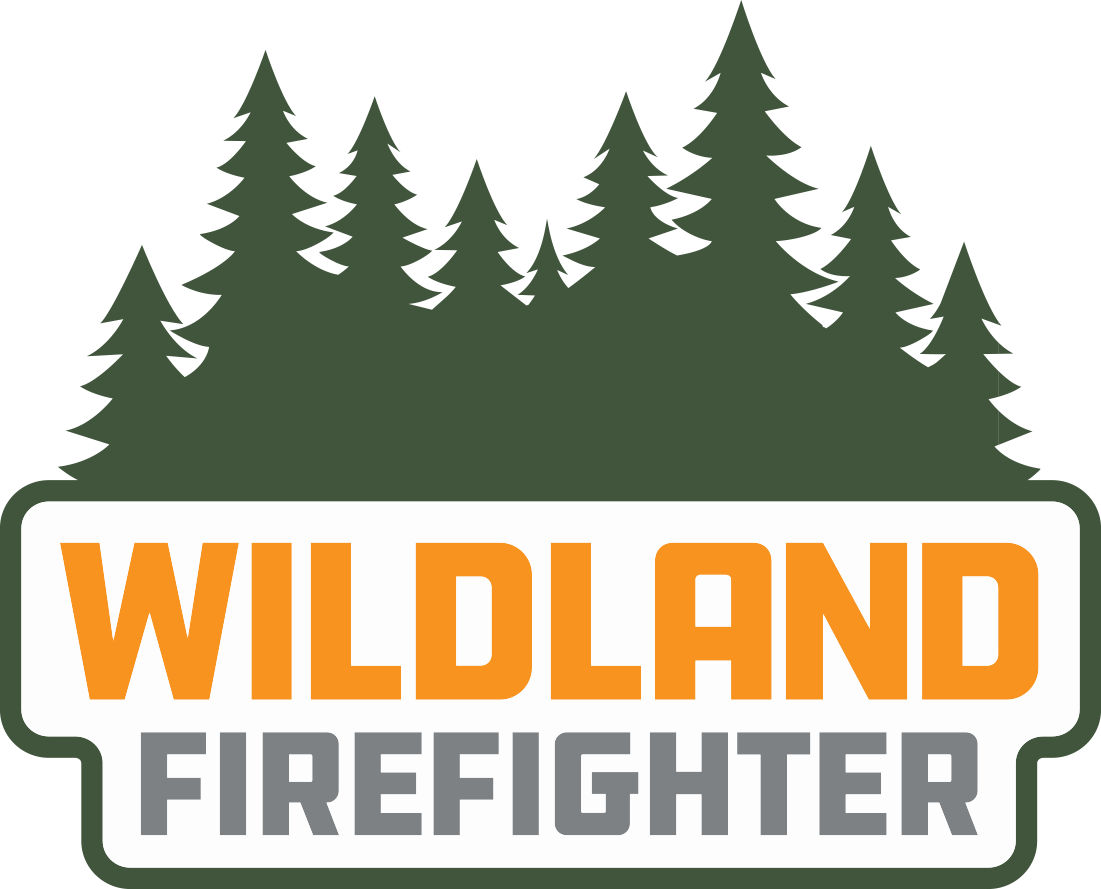
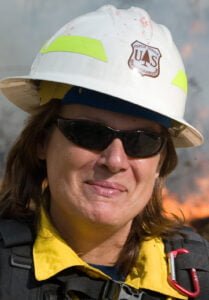 Bobbie Scopa started her career as a seasonal firefighter in 1974. After graduating from Arizona State University, she went on to work in fire and natural resource management. Eventually she left the wildand agencies to work full time for a structure fire department. She finished her Masters in Forestry at NC State then went back to the US Forest Service and BLM eventually becoming the Assistant Regional Fire Director in Region 6. Bobbie has spent many years working as a type 1 and 2 Operations Section Chief. You can listen to Bobbie tell audio stories from her long career at BobbieOnFire.com. She has also recently completed her memoir titled “Both Sides Of The Fire Line”. It will be available through Chicago Review Press late summer of 2022.
Bobbie Scopa started her career as a seasonal firefighter in 1974. After graduating from Arizona State University, she went on to work in fire and natural resource management. Eventually she left the wildand agencies to work full time for a structure fire department. She finished her Masters in Forestry at NC State then went back to the US Forest Service and BLM eventually becoming the Assistant Regional Fire Director in Region 6. Bobbie has spent many years working as a type 1 and 2 Operations Section Chief. You can listen to Bobbie tell audio stories from her long career at BobbieOnFire.com. She has also recently completed her memoir titled “Both Sides Of The Fire Line”. It will be available through Chicago Review Press late summer of 2022.